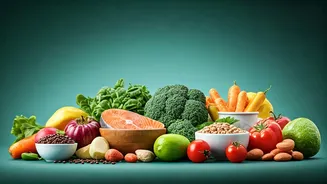Understanding Digestive Health
Before delving into specific fruits, it's crucial to grasp the essentials of digestive health. The digestive system is responsible for breaking down food,
absorbing nutrients, and eliminating waste. Problems can arise from various factors, including poor diet, lack of fiber, insufficient hydration, and stress. A healthy diet rich in fiber, water, and essential nutrients is vital for maintaining proper digestion. Fiber adds bulk to the stool, promoting regular bowel movements. Water keeps everything moving smoothly, preventing constipation. Additionally, a balanced diet helps maintain a healthy gut microbiome, which plays a pivotal role in nutrient absorption and overall well-being. Understanding these fundamentals sets the stage for exploring how specific fruits can support and enhance this intricate process. It's about nurturing your gut to create a thriving internal environment.
Watermelon: Hydration and Support
Watermelon is primarily composed of water, making it an excellent choice for hydration. Adequate hydration is fundamental for digestive health, as it helps soften stools, thus easing their passage through the intestines. Beyond hydration, watermelon contains citrulline, an amino acid with potential benefits for improving blood flow. Moreover, this juicy fruit provides a moderate amount of fiber, which helps add bulk to the stool. Watermelon can be a refreshing and delicious way to support healthy digestion, especially in hot weather, where dehydration is more common. Including watermelon in your diet could be an easy step towards improving your digestive comfort. Enjoying this fruit is a step towards a well-hydrated and smoothly functioning digestive system.
Berries: Fiber Powerhouses
Berries such as strawberries, blueberries, raspberries, and blackberries are renowned for their high fiber content. Fiber is essential for digestive health, aiding in preventing constipation by adding bulk to the stool. Berries also contain antioxidants, which may reduce inflammation in the digestive tract. The fiber content in berries also helps to slow down the digestion process, leading to a steadier release of sugars into the bloodstream, which is beneficial for blood sugar regulation. These delicious fruits are not only satisfying but also contribute significantly to a healthy digestive system. Incorporating berries into your diet can improve bowel regularity and support overall gut health.
Pineapple: Digestive Enzymes
Pineapple stands out due to its bromelain content, a group of enzymes that aids in protein digestion. Bromelain helps break down proteins, making it easier for the body to absorb nutrients and relieving digestive discomfort. This enzyme can also reduce inflammation, potentially alleviating symptoms of conditions like irritable bowel syndrome (IBS). Apart from bromelain, pineapple offers a good source of vitamin C, which supports immune function. Including pineapple in your diet, either fresh or as a juice, can offer a unique digestive boost, making it a valuable addition to your daily routine. The enzymes in pineapple can significantly improve your ability to break down food, making it an effective choice for digestive health.
Kiwi: Gut-Friendly Fiber
Kiwi, with its small size, is a powerhouse of nutrients, including fiber and actinidin, an enzyme that facilitates protein digestion. The fiber in kiwis helps in regular bowel movements and alleviates constipation. Actinidin supports protein breakdown, reducing bloating and digestive discomfort. Moreover, kiwis contain antioxidants that may reduce inflammation and protect the digestive tract. Consuming kiwi regularly can improve gut health by enhancing the digestive process and promoting regularity. Enjoying this fruit is a simple way to improve your digestion. Adding kiwi to your diet can become a delicious and effective step towards improved digestive comfort and function.
Avocado: Healthy Fats
Avocados are rich in healthy fats and fiber, both essential for digestive health. The healthy fats help in lubricating the digestive tract, aiding the smooth passage of food. Avocados contain both soluble and insoluble fiber, which helps regulate bowel movements. Soluble fiber absorbs water, softening stools, while insoluble fiber adds bulk. Moreover, avocados are packed with nutrients and antioxidants. Incorporating avocados into your diet can not only enhance digestion but also contribute to overall cardiovascular health, as healthy fats can positively affect cholesterol levels. Whether in a salad, smoothie, or simply on toast, avocados provide a nutrient-rich boost to your digestive system.
Magnesium-Rich Fruits
The gastroenterologist also highlights fruits that are rich in magnesium, as this mineral is crucial for various bodily functions, including digestive health. Magnesium helps relax the muscles in the digestive tract, making it easier for food to move through. Constipation may be relieved by adequate magnesium intake, and it may reduce the chance of developing issues such as bloating. Fruits high in magnesium, include avocados, kiwis, and certain berries, offer a dual benefit by providing fiber and magnesium, which support digestion. Ensuring you consume enough magnesium-rich fruits can provide numerous benefits to the entire gastrointestinal process. Consuming these fruits may contribute to smoother digestion and overall digestive comfort.
Benefits and Considerations
Including these fruits in your diet offers various benefits for digestive health. Fruits are rich in fiber, which adds bulk to stools, aiding in regularity. They also provide essential vitamins, minerals, and antioxidants. However, it's essential to consider individual sensitivities and preferences. Some people may experience bloating or other discomforts with certain fruits. Moderation is key, and it is also helpful to introduce fruits gradually to give your digestive system time to adjust. If you have underlying digestive issues or allergies, consulting a healthcare professional or a registered dietitian is advisable. They can provide personalized recommendations based on your specific needs, helping you enjoy these fruits safely and effectively.
Creating a Digestive Diet
Building a gut-friendly diet extends beyond just consuming specific fruits. It involves a holistic approach to eating. This means focusing on high-fiber foods like whole grains, legumes, and vegetables. Staying adequately hydrated is essential for aiding digestion and promoting regularity. Probiotic-rich foods, like yogurt, can enhance gut health by increasing beneficial bacteria. Minimize processed foods, sugary drinks, and excessive amounts of saturated fats, as these can worsen digestive issues. Regular physical activity is also important, as it helps stimulate digestion. Adopting an eating plan that incorporates these elements alongside digestion-friendly fruits will contribute to overall well-being and a healthy digestive system.
Fruits for a Better Gut
Incorporating the fruits mentioned—watermelon, berries, pineapple, kiwi, and avocado—into your diet can significantly benefit your digestive system. Each fruit offers unique properties, from hydration and fiber to digestive enzymes and essential nutrients. These fruits support healthy bowel movements, reduce digestive discomfort, and enhance gut health. Remember to pair these fruits with a broader diet that includes fiber, hydration, and probiotics. By prioritizing these fruits and adopting a balanced lifestyle, you can improve your digestion and enjoy long-term digestive well-being. The inclusion of these fruits is a step towards a healthier and more comfortable digestive experience.




















